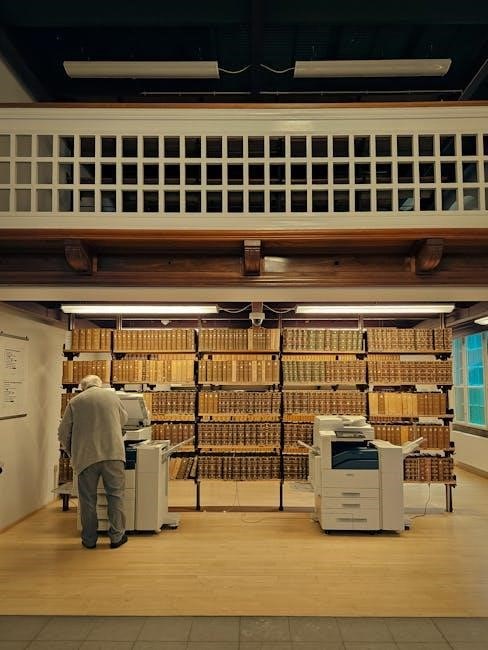Maxwell Archives represent a comprehensive system for secure and efficient digital document management‚ particularly for PDFs. They provide organized storage‚ easy retrieval‚ and reliable preservation of data‚ enhancing accessibility and collaboration for both individuals and organizations.
Definition and Purpose

Maxwell Archives is a sophisticated digital archiving system designed to manage and preserve large volumes of PDF documents efficiently. Its primary purpose is to provide a centralized repository for secure storage‚ organized retrieval‚ and long-term preservation of digital files. By utilizing advanced metadata tagging and search functionalities‚ Maxwell Archives enables users to quickly locate specific documents within vast collections. The system is tailored for both individual and organizational needs‚ ensuring that critical information remains accessible and protected. Its core function revolves around maintaining document integrity‚ reducing storage clutter‚ and enhancing overall productivity through streamlined workflows. Additionally‚ Maxwell Archives supports version control‚ ensuring that updates to documents are tracked and preserved accurately. This makes it an indispensable tool for maintaining structured and secure digital records. The system’s robust framework is designed to adapt to evolving data management requirements‚ making it a reliable solution for modern archiving needs.

Importance of Digital Archiving
Digital archiving is critically important for preserving valuable information in a rapidly evolving technological landscape. It ensures that critical documents‚ such as PDFs‚ remain accessible and intact over time‚ safeguarding against data loss or degradation. Archiving systems like Maxwell Archives play a vital role in maintaining organizational memory‚ enabling historical research‚ and supporting compliance with legal and regulatory requirements. By centralizing data storage‚ digital archiving enhances security‚ reduces duplication‚ and streamlines information retrieval. It also mitigates risks associated with physical storage‚ such as damage or theft. Furthermore‚ digital archiving supports sustainability by reducing the need for physical materials. In today’s data-driven world‚ the ability to archive and manage digital content efficiently is essential for both individuals and organizations‚ ensuring continuity and fostering innovation. The benefits of digital archiving extend across industries‚ making it a cornerstone of modern information management.

Historical Background
The concept of digital archiving emerged alongside advancements in computing and storage technologies‚ with PDFs becoming a standard format for preserving documents. Early systems focused on basic storage‚ evolving into sophisticated platforms like Maxwell Archives‚ which prioritize organization‚ accessibility‚ and security.
Evolution of Digital Archiving
Digital archiving has evolved significantly‚ transitioning from physical storage to advanced digital systems. Early methods relied on basic formats and local storage‚ while modern solutions like Maxwell Archives integrate PDF management with enhanced search‚ retrieval‚ and security features. The rise of cloud technology and AI-driven tools has further transformed archiving‚ enabling seamless accessibility and collaboration. Today‚ digital archiving emphasizes data integrity‚ privacy‚ and efficiency‚ catering to growing demands for organized and secure document preservation. This evolution reflects the necessity of adapting to technological advancements and user needs‚ ensuring that archives remain reliable and accessible for future generations.
Development of Maxwell Archives
The development of Maxwell Archives began with the need for robust digital document management solutions. Initially focused on PDF organization‚ it expanded to include advanced features like metadata tagging and secure storage. By integrating AI and machine learning‚ Maxwell Archives enhanced search capabilities and automated archiving processes. The system was designed to address challenges such as data overload and retrieval efficiency‚ ensuring seamless collaboration and accessibility. Its evolution reflects a commitment to innovation‚ making it a trusted platform for individuals and organizations seeking reliable digital archiving solutions.

Benefits of Maxwell Archives
Maxwell Archives offer enhanced efficiency‚ secure storage‚ and easy access to PDF documents‚ fostering collaboration and reducing storage costs while ensuring data integrity and accessibility.
Advantages Over Traditional Methods
Maxwell Archives surpass traditional archiving methods by offering centralized digital storage‚ advanced search capabilities‚ and version control. They eliminate physical storage constraints‚ ensuring documents are accessible anytime‚ anywhere. With robust security features‚ they protect sensitive data from unauthorized access. Collaboration is enhanced through shared access and real-time updates‚ fostering teamwork. Automated organization and tagging reduce manual effort‚ while scalable solutions adapt to growing data needs. These advantages make Maxwell Archives a modern‚ efficient alternative to outdated systems‚ streamlining workflows and improving productivity for users.
Enhancing Accessibility and Collaboration
Maxwell Archives significantly enhance accessibility by providing cloud-based storage‚ enabling users to retrieve documents from any location with internet access. This eliminates the need for physical storage‚ reducing retrieval times and improving overall efficiency. Collaboration is streamlined through shared access features‚ allowing multiple users to view and edit documents simultaneously. Advanced search functionalities and tagging systems ensure that users can quickly locate specific PDFs‚ fostering productivity. Additionally‚ version control features prevent data loss and ensure that all team members are working with the most up-to-date versions. These capabilities make Maxwell Archives an invaluable tool for teams and organizations seeking to enhance collaboration and accessibility in a digital workspace.

Challenges in Digital Archiving
Digital archiving faces challenges like ensuring data privacy‚ managing storage costs‚ and maintaining document integrity over time‚ all while adapting to evolving technological standards and user needs.
Common Technical Issues
Digital archiving systems‚ including Maxwell Archives‚ often encounter technical challenges such as data corruption‚ format incompatibilities‚ and storage limitations. Ensuring long-term accessibility requires consistent updates to handle evolving file formats and storage technologies. Privacy and security concerns also pose significant technical hurdles‚ as safeguarding sensitive information from breaches or unauthorized access is paramount. Additionally‚ issues like slow retrieval speeds and search inaccuracies can hinder user experience. Regular system maintenance and updates are essential to mitigate these challenges and ensure the integrity and usability of archived data over time.
Privacy and Security Concerns

Privacy and security are critical considerations in digital archiving‚ particularly with sensitive PDF documents. Maxwell Archives must adhere to data minimization principles‚ ensuring only necessary information is collected and stored. Encrypting data and implementing strict access controls are essential to prevent unauthorized access and breaches. Regular audits and compliance with privacy regulations further safeguard sensitive information. Additionally‚ protecting against malware and viruses is vital‚ as infected files can compromise the entire archive. Balancing robust security measures with user accessibility remains a key challenge‚ requiring continuous monitoring and updates to maintain trust and integrity in the system.
Best Practices for PDF Archiving
Effective PDF archiving involves organizing files with clear naming conventions‚ using metadata for easy search‚ and ensuring secure storage to maintain integrity and accessibility over time.

Effective Organization Strategies
Effective organization is crucial for maximizing the efficiency of Maxwell Archives. Implementing a clear folder hierarchy ensures easy navigation and retrieval of PDF documents. Using consistent naming conventions for files helps maintain uniformity and reduces confusion. Incorporating metadata‚ such as keywords and tags‚ enhances searchability and simplifies categorization. Regularly backing up archives prevents data loss and ensures long-term accessibility; Utilizing version control systems helps track changes and maintains document integrity. Centralizing storage solutions‚ like cloud-based repositories‚ promotes collaboration and remote access. Implementing access controls and encryption safeguards sensitive information. Regular audits and updates keep the archive organized and relevant. These strategies collectively enhance the overall functionality and value of Maxwell Archives.
Importance of Metadata and Tagging
Metadata and tagging are essential for optimizing the functionality of Maxwell Archives. Metadata provides critical information about PDF documents‚ such as creation dates‚ authors‚ and content summaries‚ enabling efficient searching and categorization. Tagging allows users to assign keywords or labels‚ further enhancing document organization and retrieval. This system ensures that archived files are easily accessible and searchable‚ even within large collections. Proper metadata management also supports compliance with privacy and data minimization principles‚ as it helps identify and manage sensitive information. Additionally‚ consistent metadata practices facilitate collaboration‚ as users can quickly locate and share relevant documents. By incorporating metadata and tagging‚ Maxwell Archives become more versatile‚ secure‚ and user-friendly‚ ensuring long-term data integrity and accessibility.

Future Trends and Innovations
Maxwell Archives are expected to embrace AI-driven advancements‚ enhancing document management with intelligent tagging‚ automated organization‚ and advanced search capabilities‚ ensuring secure and accessible digital preservation.
Emerging Technologies in Archiving
Emerging technologies like AI‚ blockchain‚ and quantum computing are revolutionizing archiving. AI enables intelligent document tagging and automated categorization‚ while blockchain ensures data integrity and security. Quantum computing promises faster processing of large datasets‚ enhancing search and retrieval efficiency. Cloud-native solutions and decentralized storage systems are also gaining traction‚ offering scalable and resilient archiving options. These innovations are expected to transform how Maxwell Archives operate‚ providing advanced features like predictive analytics and self-healing data storage. By integrating these technologies‚ Maxwell Archives can offer unparalleled security‚ accessibility‚ and efficiency‚ setting new standards in digital preservation.

Impact of AI and Machine Learning
AI and machine learning are transforming Maxwell Archives by enabling advanced automation and intelligent document management. These technologies enhance search capabilities through natural language processing and improve data organization with automated tagging. Machine learning algorithms can detect patterns‚ predict user needs‚ and optimize storage efficiency. AI-driven systems also ensure data integrity by identifying duplicates and anomalies‚ reducing errors in archiving. Additionally‚ AI-powered tools can summarize documents‚ extract key information‚ and recommend relevant content‚ making archives more accessible and user-friendly. By integrating AI‚ Maxwell Archives can provide personalized experiences‚ streamline workflows‚ and ensure robust security. This innovation not only improves efficiency but also enhances the overall value of archived data for users.